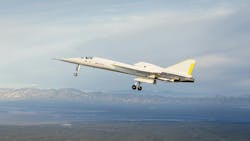MOJAVE, Calif. - Boom Supersonic, the Denver-based company building a faster-than-sound commercial aircraft, Overture, announced the successful flight of XB-1, an independently-developed supersonic jet, at the Mojave Air & Space Port in Mojave, California. Like Overture, XB-1 leverages state-of-the-art technologies to enable efficient supersonic flight including carbon fiber composites, advanced avionics, digitally-optimized aerodynamics, and an advanced supersonic propulsion system.
XB-1 was flown by Boom Chief Test Pilot Bill "Doc" Shoemaker and Test Pilot Tristan "Geppetto" Brandenburg flew the T-38 chase aircraft which monitored the flight. XB-1 took off from the Mojave Air & Space Port and met all of its test objectives, including successfully achieving an altitude of 7,120 feet and speeds up to 238 knots (273 mph).
XB-1 validates key technologies and innovations, including its augmented reality vision system. Two nose-mounted cameras, digitally augmented with attitude and flight path indications, feed a high-resolution pilot display enabling excellent runway visibility. This system enables improved aerodynamic efficiency without the weight and complexity of a movable nose.
Related: Boom Supersonic selects Honeywell's Anthem for its Overture flight deck
Engineers used computational fluid dynamics simulations in its digitally-optimized aerodynamics to explore thousands of designs for XB-1. The result is an optimized design that combines safe and stable operation at takeoff and landing with efficiency at supersonic speeds.
The XB-1 is almost entirely made from carbon fiber composite materials, enabling it to realize a sophisticated aerodynamic design in a strong, lightweight structure.
XB-1's engine intakes slow supersonic air to subsonic speeds, efficiently converting kinetic energy into pressure energy, and allowing conventional jet engines to power XB-1 from takeoff through supersonic flight.
Related: Boom Supersonic looks to tap defense potential for commercial aircraft
The inaugural flight of the XB-1 demonstrator takes place as Overture continues to advance toward production, with a growing global network of Tier 1 suppliers and an order book including 130 orders and pre-orders from American Airlines, United Airlines, and Japan Airlines. Overture will carry 64-80 passengers at Mach 1.7, about twice the speed of today's subsonic airliners. Optimized for speed, safety, and sustainability, Overture is designed to run on up to 100% sustainable aviation fuel (SAF).

